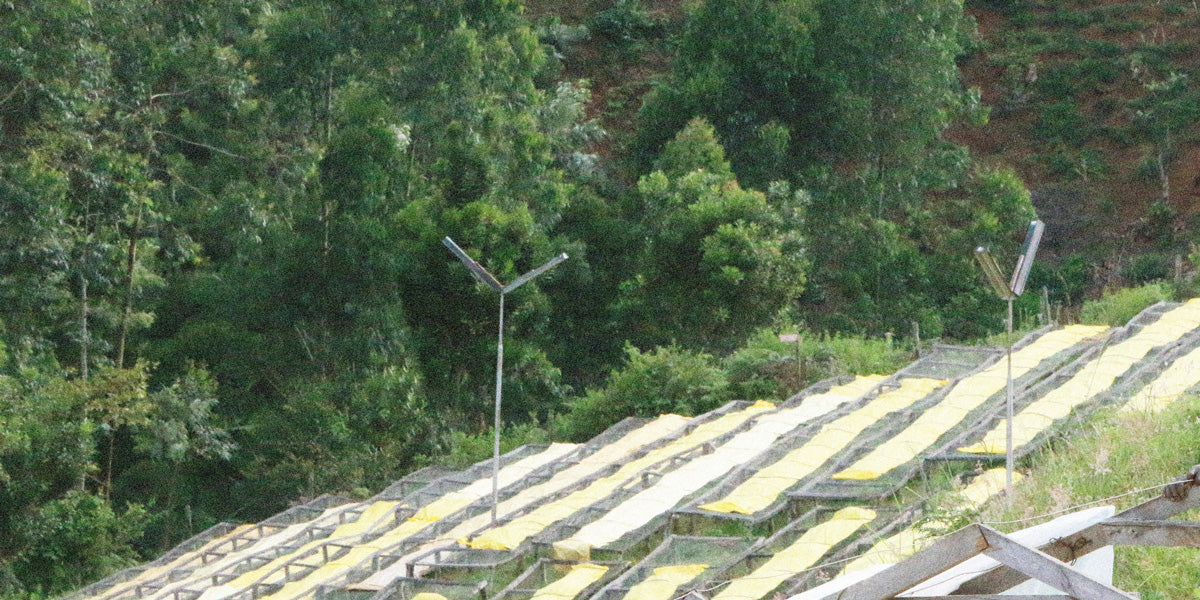Producer Profiles Main Page •
Back to Producers OverviewMeet the Rungeto Farmers Cooperative: Coffee Producers in Kirinyaga, Kenya
We first connected with the Rungeto Farmers Cooperative Society through Cafe Imports a few years back, and their coffee has become one of those partnerships we look forward to every season. What drew us in wasn't just the quality in the cup, it was learning about how this community came together and what they've built on the southern slopes of Mt. Kenya.
The Kii factory sits at the foot of the mountain in Kirinyaga County, in a place called Ngariama. It's one of three processing stations run by the Rungeto cooperative, alongside Karimikui and Kiangoi. Together, these factories serve over 850 smallholder farmers who've been tending coffee trees in this region since 1953.
From Reorganization to Reputation
The story of Rungeto begins with an ending. In 1997, the Ngariama Cooperative dissolved after decades of operation. But the farmers in the area knew they needed a way to process and market their coffee together, so they reorganized. They took over the three existing factories, including Kii, which had been processing coffee since 1965, and formed the Rungeto Farmers Cooperative Society.
Today, the cooperative is managed by an elected board of seven members, two from each factory catchment area plus a women's representative who rotates. A secretary manager handles the day-to-day operations, overseeing 25 permanent staff members. The structure is democratic, with each board member representing an electoral zone in the broader Rungeto area.
The farmers themselves are true smallholders. Most own less than a third of a hectare, about 400 coffee trees on average. They're growing their coffee in rich, volcanic soil between 1,600 and 1,900 meters above sea level, in a landscape shaped by the runoff from Mt. Kenya's snow-capped peaks.
Water, Attention, and Time
What sets Kii apart is the attention to detail at every stage. The factory gets its name, and its processing water, from the Kii River. This clean mountain water is essential to the way they wash their coffee, and the farmers and factory staff treat it as the valuable resource it is.
Cherry selection starts at the farm. Farmers handpick only ripe cherries and deliver them to the factory the same day. At intake, a Cherry Clerk oversees visual sorting, accepting only dense, ripe fruit. This initial quality control sets the tone for everything that follows.
Once cherries pass inspection, they're depulped and fermented for 16 to 24 hours, depending on the ambient temperature. After fermentation, the coffee is washed in clean river water and soaked for another 12 hours. The factory has installed tiles in the washing channels to help preserve both coffee and water quality. All wastewater is filtered through earthen pits before being reintroduced to local waterways.
Drying happens slowly on raised beds. Workers rake the parchment frequently to ensure even drying and cover it during the hottest part of the day to maintain a slow, steady pace. At night, they cover it again to protect against moisture. The whole process takes about 14 days.
Our Partnership Through Cafe Imports
We've worked with Cafe Imports for several years now, drawn to their B Corp certification and their commitment to building long-term relationships with producers. They achieved B Corp status in 2023, earning a score of 84.6 when the median for ordinary businesses is just 50.9. They've also been carbon neutral since 2008.
Through Cafe Imports, we've been able to purchase coffee from Rungeto consistently, which matters because these relationships are built year after year. The consistency isn't just about business, it's about knowing the people and practices behind the coffee we serve.
Cafe Imports' sourcing model focuses on providing price premiums and supporting smallholder farmers with access to specialty markets. For a cooperative like Rungeto, this kind of partnership means their attention to quality gets recognized and rewarded in a way that benefits all 850-plus member families.
Beyond Coffee
One thing that struck us about Rungeto is how they've diversified beyond coffee. The cooperative operates a dairy cooling plant that collects over 120,000 liters of milk each month, supplying one of Kenya's largest dairy companies. This gives farmers another income stream and makes their livelihoods less dependent on coffee prices alone.
They've also used Fairtrade premiums to establish a fuel station in the area. These kinds of community investments, infrastructure that serves everyone, speak to how the cooperative thinks about development and sustainability. It's not just about growing better coffee, it's about building a stronger community.
The quality coming out of Rungeto hasn't gone unnoticed in Kenya's competitive coffee industry. Their Kiangoi factory recently won the International Taste Award competition in Rwanda, and Kii has fetched some of the highest prices at auction in recent years. In a country known for exceptional coffee, that kind of recognition matters.
What Makes Them Partners Worth Knowing
Working with a cooperative like Rungeto reminds us why direct relationships matter in coffee. These aren't anonymous transactions, they're ongoing partnerships with real people who've been farming this land for generations. The farmers at Rungeto have been growing coffee on the slopes of Mt. Kenya since 1953, weathering changes in markets, governments, and climate.
What we respect most is their commitment to doing things right, even when it takes more time, more labor, more attention. The meticulous sorting, the careful fermentation timing, the slow drying, none of these shortcuts are taken. They've built a reputation for consistency and cleanliness in their processing, and that reputation is hard-earned.
When you're buying coffee from over 850 families, maintaining quality across that many small plots requires systems, trust, and shared standards. The fact that Rungeto has managed this since 1997, building on foundations laid decades earlier, tells you something about the strength of the community and the quality of their leadership.
We're grateful to have found Rungeto through our partnership with Cafe Imports. Their coffee shows up in our roastery as a reminder that behind every bag is a community of farmers who care deeply about their craft and their land. That's the kind of partnership worth sustaining.



